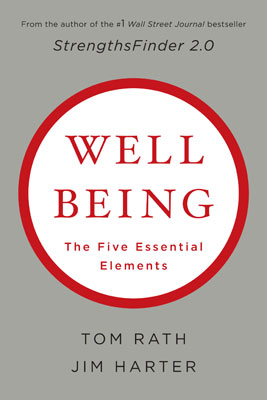Wellbeing: The Five Essential Elements

Wellbeing: The Five Essential Elements
New York Times bestselling authors Tom Rath and Jim Harter have once again teamed up to share the results of a landmark Gallup study of wellbeing and its implications for organisations and individuals in Wellbeing: The Five Essential Elements.
The groundbreaking research reveals how organisations can help employees boost their overall wellbeing - from their satisfaction with their careers to their financial security and level of community involvement. As it turns out, changing an organisation's culture to help employees better manage and improve their wellbeing over time can result in substantial financial returns for the organisation.
Based on a Gallup study of more than 150 countries representing 98% of the world's population, Rath and Harter identified five essential elements of life that transcend countries, faiths, and cultures:
Career Wellbeing: How you occupy your time/liking what you do each day
Social Wellbeing: Relationships and love in your life
Financial Wellbeing: Managing your economic life to reduce stress and increase security
Physical Wellbeing: Good health and enough energy to get things done on a daily basis
Community Wellbeing: Engagement and involvement in the area where you live
After conducting this extensive study, Rath and Harter discovered that much of what we think will improve our wellbeing is either misguided or just plain wrong. "Contrary to what many people believe, wellbeing isn't just about being happy. Nor is it only about being wealthy or successful. And it's certainly not limited to physical health and wellness. In fact, focusing on any of these elements in isolation could drive us to feelings of frustration and even failure."
Wellbeing: The Five Essential Elements is a research-based blueprint for understanding what makes life worthwhile. Acting on Rath and Harter's discoveries will enable you to enjoy each day and get more out of your life - while boosting the wellbeing of friends, family members, colleagues, and others in your community.
"When leaders embrace the opportunity to improve employees "wellbeing," write Rath and Harter, "they create more engaging places to work and greater returns for the organisation. And they even help strengthen their employees' families. But when leaders opt to ignore employees' wellbeing - dismissing it as something that's "none of their business" - they erode the confidence of those who follow them and limit their organisation's ability to grow."
Headline findings from the book include:
Over the past decade, Gallup has introduced the concepts of strengths-based development and employee engagement to more than 20 million people around the world - largely through the #1 Wall Street Journal bestseller StrengthsFinder 2.0 by Tom Rath and the New York Times bestseller 12: The Elements of Great Managing, which was co-authored by engagement expert Jim Harter.
Wellbeing: The Five Essential Elements
Authors: Tom Rath and Jim Harter
ISBN: 9781595620408
Interview with Allan Watkinson
Allan Watkinson, Engagement Manager, Gallup ConsultingWhat exactly is wellbeing?
Allan Watkinson: Most people don't know what's good for them! Most of us equate wellbeing with wealth and health. But that's not the whole story.
Our research shows that most of what we thought about wellbeing is wrong, including the definition of wellbeing. As the authors noted in Wellbeing: The Five Essential Elements, wellbeing is the result of fulfillment of five interconnected elements - Career Wellbeing, Social Wellbeing, Financial Wellbeing, Physical Wellbeing, and Community Wellbeing. Those who have high levels of each are more likely to thrive, no matter who they are or where they live.
Gallup has arrived at these conclusions after years of study, including a thorough review of decades of research on wellbeing and a comprehensive global study of wellbeing in more than 150 countries.
How does 20 minutes of exercise in the morning boost your mood for the rest of the day?
Allan Watkinson: The authors cite some research in the book that found if you work out for at least 20 minutes in the morning, you can boost your mood for three to twelve hours. So you should work out in the morning because it's a way to have a better day, not just because it'll decrease your blood pressure a few years later. You're also more likely to have a good time after work - socialising with friends and family and playing around with the kids. You'll have more energy, which is such a big component of each day. Your mood will be better, and that will increase your likelihood of doing other things that are good for you as well. Even if you're time-poor, a mere 11 minutes of lifting weights can help you burn fat throughout the day due to an increase in your metabolic rate, even when you don't have 20 or 30 minutes of exercise!
The same principle applies to food. What's interesting to the authors, as they started to dig into the research about Physical Wellbeing, is that food has more of an impact on our energy and mood on a daily basis than they would have guessed. So if you order a cheeseburger and fries for lunch today, and especially if you add a milkshake, you won't get much done at work that afternoon. You'll be a little sleepier, you won't have as many good ideas, and you will be much less likely to go out and exercise or socialise after work. A bad meal can have a detrimental impact on the rest of the day, not just your health or weight a decade later.
Four of the five key findings are money related; does this prove that money makes us happy?
Allan Watkinson: Does money buy happiness? Well, kind of. If you live in a wealthier country, you are more likely to be thriving, that is, to evaluate that you are doing well in your overall life. Money doesn't guarantee a good life, but if you're in a high-GDP country, your odds of perceiving that you have a good life improve.
Money can buy happiness - as long as it buys good experiences, which includes giving. While it's true that the material things we buy don't make us happy for very long, money does fund security, charity, and experiences, which can lead to increased wellbeing. And wellbeing is much more than happiness. We've arrived at these conclusions after years of study, including a thorough review of decades of research on wellbeing and a comprehensive global study of wellbeing in more than 150 countries.
Remember, though, there's a difference between happiness and wellbeing. Happiness is an ephemeral experiential quality, while wellbeing refers both to how you think about your life and how you experience your days. When we look at how people experience their days, the data shows that what people do with their money matters much more to their wellbeing than how much money they have.
This statement is a huge claim, "Our wellbeing actually recovers more rapidly from the death of a spouse than it does from a sustained period of unemployment." What is it based on?
Allan Watkinson: An interesting study in The Economic Journal reported that if you've been out of work for more than a year, the overall baseline of how you evaluate your life doesn't appear to fully recover after two years, as it does from most major life events. This finding suggests that, given the current economic climate, there are probably much more severe and profound implications of sustained unemployment than we're able to see in some of the data today. We suspect this is because work is not only a core part of your time use on a day-to-day basis, but also of your identity as a person. When you meet a stranger, one of the first questions you ask is "What do you do?" Work is crucial to how we relate to people and evaluate our lives at a very basic level.
Career identity is really important. In fact, we found that generally, one's sense of pride goes up along with hours worked. The more hours you work, the greater your sense of pride -- and that's true for people all over the world. I think there's something about work and pride and identity, as Tom said, that explains part of why Career Wellbeing is so foundational.
Can you talk us through the five essential elements of life and how they relate to our wellbeing?
Allan Watkinson: For more than 50 years, Gallup scientists have been exploring the demands of a life well-lived. More recently, in partnership with leading economists, psychologists, and other acclaimed scientists, Gallup has uncovered the common elements of wellbeing that transcend countries and cultures. This research revealed the universal elements of wellbeing that differentiate a thriving life from one spent suffering. They represent five broad categories that are essential to most people:
Career Wellbeing: how you occupy your time or simply liking what you do every day
Social Wellbeing: having strong relationships and love in your life
Financial Wellbeing: effectively managing your economic life
Physical Wellbeing: having good health and enough energy to get things done on a daily basis
Community Wellbeing: the sense of engagement you have with the area where you live
Focusing on any one of these elements in isolation can lead to feelings of frustration and possibly failure. However, only 7% of people are thriving in all five areas of wellbeing. It is therefore important for individuals to take an integrated approach to wellbeing to not only thrive in their own overall wellbeing, but to boost the wellbeing of friends, family, and others within your community.
How will this book help employees boost their overall wellbeing?
Allan Watkinson: The groundbreaking research reveals how organisations can help employees boost their overall wellbeing - from their satisfaction with their careers to their financial security and level of community involvement. After conducting this extensive study, the authors discovered that much of what we think will improve our wellbeing is either misguided or just plain wrong. The book therefore helps employees understand the importance of not focusing on any one element of wellbeing in isolation as it could drive us to feelings of frustration and even failure.
Wellbeing: The Five Essential Elements is a research-based blueprint for understanding what makes life worthwhile. Acting on Rath and Harter's discoveries will enable employees to enjoy each day and get more out of your life - while boosting the wellbeing of friends, family members, colleagues, and others in your community.
MORE



